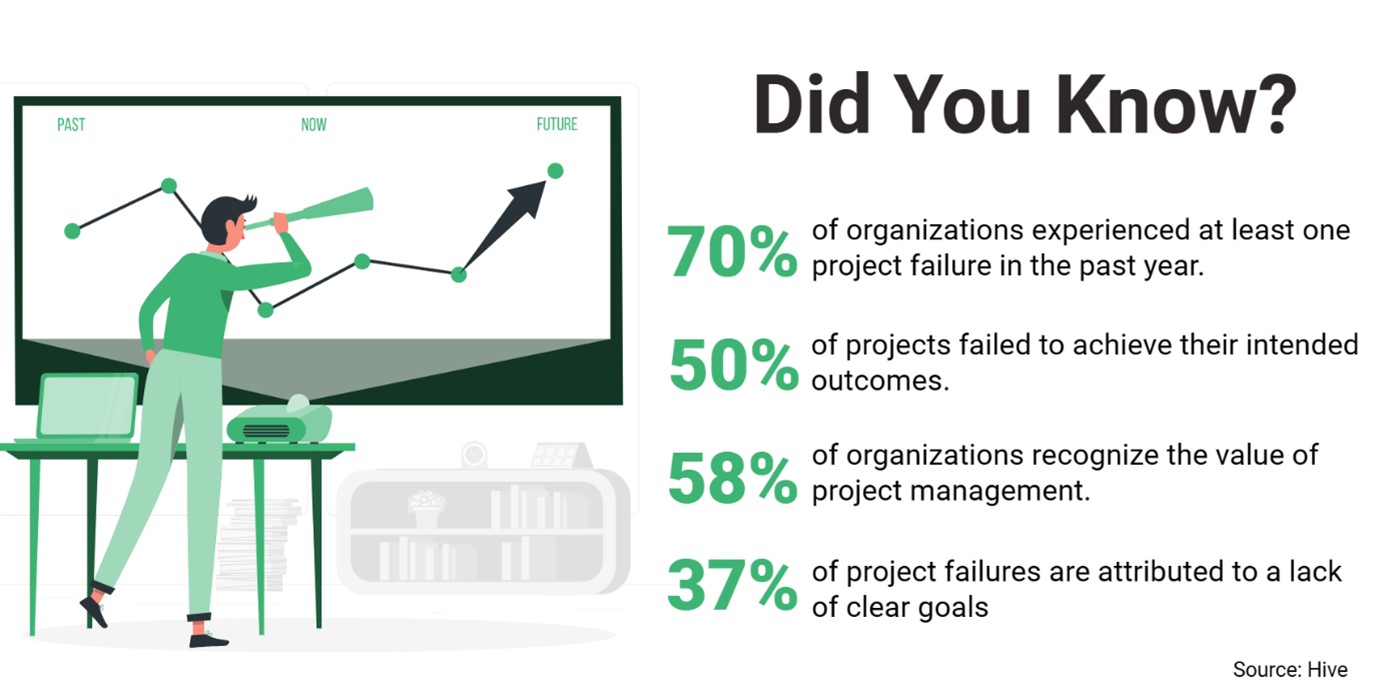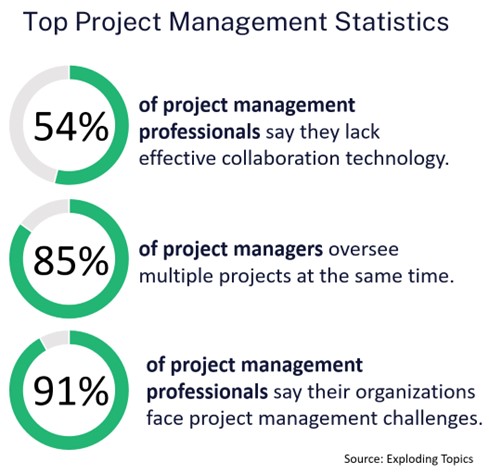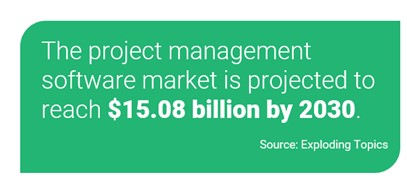
Have you ever considered the substantial resources that are squandered due to ineffectively managing project quality? 12% of resources are wasted due to poor project execution, with only 43% of organizations managing to stay within budget. A staggering 54% of organizations overlook real-time KPI tracking, leading to a cascade of failed projects and disgruntled stakeholders. Managing project quality is the unsung hero in this equation, ensuring that your meticulously planned project aligns seamlessly with cost, time, and quality expectations, ultimately impacting the success of your project. This article discusses managing project quality, its core elements, challenges, benefits, best practices, and techniques to deliver your projects with high quality every time. In addition, the article explores how AI-driven solutions enhance the capabilities of monitoring and managing project quality.
About Managing Project Quality
Managing project quality is a vital aspect of project execution. This process comprises three essential components - Quality Planning, Quality Assurance, and Quality Control. Quality Planning sets the quality standards, while Quality Assurance verifies that the project's processes adhere to them. Quality Control ensures that the project's deliverables meet the quality standards to minimize errors and rework.
The primary goal of managing project quality is to enhance customer satisfaction, meet regulatory requirements, and ensure that project objectives are achieved within the specified cost, time, and scope. AI-powered solutions can significantly improve the efficiency and effectiveness of this process, enabling organizations to reduce waste, increase productivity, and ensure that project deliverables serve their intended use. By integrating AI-led quality management into the project execution processes, organizations can enhance their reputation, increase customer satisfaction, and achieve a more successful project outcome.

(The above graphic is based on information available on the Hive website, based on various credible reports and surveys.)
So, what is project quality management?
Project quality management involves the processes and activities that determine quality policies, objectives, and responsibilities to ensure the project will satisfy the needs for which it was undertaken.
And what are quality issues in project management?
Some common quality issues in project execution include unclear quality standards, lack of quality control processes, inadequate testing, poor communication, and insufficient resources or training for quality management activities.
Given the current hyper-converged projects, leveraging AI-driven solutions is optimal for managing project quality and ensuring project deliverables meet or exceed the specified quality standards.
What are the Elements of Managing Project Quality?
Imagine pouring time and resources into a project, only to find it doesn't meet expectations at the finish line. Managing project quality often remains a secondary concern rather than a strategic priority for many organizations. Research shows that 12% of resources are wasted due to poor execution, impacting the bottom line.
A proactive approach to managing project quality is crucial. It's a continuous process integrating quality into every project phase, ensuring deliverables exceed stakeholder expectations. Here’s how it works:
- Quality Planning involves collaboration with clients and stakeholders to define clear quality objectives and metrics, utilizing detailed checklists, regular progress tracking, and open communication.
- Quality Assurance focuses on optimizing processes and maintaining adherence to quality standards through regular audits and checklists.
- Quality Control involves rigorous monitoring of project outputs, using peer reviews, regular testing, and key metrics to identify improvement areas or validate successes. This allows for timely adjustments, reducing rework, and keeping project quality on track.
Elevate your project quality management with advanced AI-powered solutions. Leverage real-time analytics for data-driven decisions, automate repetitive quality checks, and harness predictive insights to identify potential issues early on. Streamline processes and ensure consistent delivery of high-quality outcomes through AI-enabled strategies.
Challenges in Managing Project Quality
Managing project quality is complex. Key challenges include clarity on standards, measurable requirements, consistent processes, sufficient resources, stakeholder buy-in, addressing issues promptly, balancing constraints, robust quality assurance/control, managing distributed teams/vendors, overcoming resistance, and maintaining documentation. Including:
- Defining clear and measurable quality standards that meet stakeholder expectations, acknowledging the complexity involved.
- Allocating sufficient time, budget, and human resources to sustain the desired quality levels, despite potential limitations.
- Ensuring all stakeholders share a common understanding of and commitment to the project's quality expectations.
- Integrating quality management processes smoothly with the overall project plan to avoid delays or conflicts.
- Managing changes in project scope, requirements, or objectives effectively while upholding quality standards.
- Implementing a culture of continuous improvement and leveraging lessons from past projects to enhance long-term quality.

(The above graphic is based on information available on the Hive website, based on various credible reports and surveys.)
How To Manage Project Quality
Managing project quality effectively demands a strategic approach, ensuring that every aspect of the project aligns with the highest standards of excellence. But in a landscape where change is the only constant, what does a quality project manager do, how do they ensure their quality management practices are reactive, proactive, and predictive? Here are a few steps for managing project quality effectively:
- Set Specific Quality Standards - Define clear benchmarks for excellence. Use AI to establish adaptable standards that keep pace with project changes.
- Outline Clear Quality Objectives - Align quality goals with the project's vision, refining them with AI-driven analytics for attainability and optimal performance.
- Define Roles and Responsibilities - Ensure clear responsibilities for quality assurance, using AI to enhance role clarity and optimize task allocation.
- List Key Deliverables and Processes - Identify components requiring rigorous quality reviews. Prioritize with AI, focusing on those with the highest risk and impact.
- Plan Quality Management Activities - Automate routine checks and highlight critical areas, using modern technology to streamline reviews and audits.
- Select Appropriate Solutions - Opt for AI-powered solutions to transform data into actionable intelligence for continuous improvement.
- Establish Quality Management Procedures - Use AI-driven analytics to develop consistent, reliable processes based on best practices derived from past project data.
(The below graphic is based on information available on the Exploding Topics website, based on various credible reports and surveys.)

Benefits of Managing Project Quality
Elevating project quality transcends traditional practices, integrating modern AI solutions to navigate the complexities of modern project landscapes. Here's how managing project quality strategically becomes a cornerstone for project excellence:
- Customer Satisfaction - Ensures deliverables exceed expectations, enhancing client loyalty and continuity. Solutions tailor experiences to customer needs for sustained satisfaction.
- Superior Quality Deliverables - Sets industry benchmarks with robust process designs and product enhancements that redefine quality standards.
- Elevated Productivity - Efficient workflows and quality monitoring reduce reiterations, fostering a culture of excellence and enhancing productivity.
- Financial Optimization - Prevents financial overruns and boosts profitability with strategic financial oversight, ensuring cost-effectiveness.
- Optimized Project Performance - Quality monitoring and performance-tracking solutions improve timelines and outcomes, optimizing project execution.
- Strategic Resource Allocation - Smart resource management ensures optimal utilization, preventing burnout and maximizing productivity.
- Boosted Stakeholder Confidence - Transparency and predictability in outcomes build trust, enhanced by reliable project delivery.
- Proactive Quality Assurance - Shifts from reactive to proactive management, utilizing predictive insights to maintain project integrity and continuity.
- Cultivating Continuous Improvement - Supports incremental enhancements, driving advancements in managing project quality.
Managing project quality with advanced execution solutions, especially those enhanced by AI, is crucial for navigating modern project complexities. This holistic approach ensures superior project monitoring and outcomes, setting new standards in project execution excellence.
Techniques of Monitoring Project Quality
 Ensuring the highest quality of deliverables in project execution is paramount. Employing effective techniques for managing project quality helps identify and mitigate issues before they escalate and contribute to the project's overall success. Integrating advanced AI analytical solutions into these techniques can significantly enhance their effectiveness, providing deeper insights and predictive capabilities that traditional methods alone cannot offer. Here are some tips for managing project quality:
Ensuring the highest quality of deliverables in project execution is paramount. Employing effective techniques for managing project quality helps identify and mitigate issues before they escalate and contribute to the project's overall success. Integrating advanced AI analytical solutions into these techniques can significantly enhance their effectiveness, providing deeper insights and predictive capabilities that traditional methods alone cannot offer. Here are some tips for managing project quality:
- Quality Audits - Regular quality audits ensure project activities align with standards. An AI solution streamlines this process, offering data-driven insights and identifying non-conformities with precision, enhancing project execution.
- Performance Measurements - Key performance indicators and metrics allow for quantitative quality assessment. Advanced AI solutions process complex data sets for a nuanced view of project performance, aiding timely decision-making.
- Peer Reviews - Evaluations by team members or experts are vital. AI enhances these reviews, using past data to highlight potential concerns, thereby improving project quality.
- Root Cause Analysis - Techniques like the Five Whys or Fishbone Diagram uncover underlying issues. AI-driven analysis predicts problems before they arise, ensuring effective resolution strategies.
- Customer Feedback - Gathering client insights is invaluable. AI analyzes feedback at scale, identifying trends and sentiments and ensuring project deliverables meet customer expectations.
- Control Charts - Statistical methods monitor project processes. AI integration enhances predictive accuracy, providing early warnings about quality deviations, thus safeguarding quality.
- Continuous Improvement Processes —Adopting methodologies like Kaizen or Six Sigma enhances quality. AI-powered solutions efficiently identify improvement opportunities, driving continuous advancement in project quality management.
Advanced AI-driven analytical solutions are a powerful ally in managing project quality. Imagine AI's ability to enhance and transform these techniques, offering predictive insights, automating complex analyses, and providing decision-makers unparalleled clarity and foresight. This elevates project quality from a mere objective to a strategic asset, driving projects toward unprecedented excellence and efficiency.
Conclusion
Navigating the intricacies of managing project quality requires a robust framework that identifies and resolves immediate challenges and anticipates future hurdles. Integrating AI-driven solutions into this framework heralds a new era of predictive intelligence, enabling a proactive approach to managing project quality. With the ability to analyze vast datasets and predict outcomes, AI empowers project managers to make informed decisions, streamline operations, and ensure deliverables meet the highest standards of excellence.
Ensuring consistent project quality is critical yet increasingly challenging in today's complex landscape. TrueProject is the ideal analytical solution for optimizing and managing project quality. Its powerful AI capabilities enable real-time monitoring, automated quality checks, predictive analytics, and data-driven decision-making throughout the project lifecycle. With TrueProject, you can define clear quality standards, ensure process adherence, and maintain rigorous quality control, minimizing rework and waste. Invest in TrueProject’s AI-led predictive intelligence solution to deliver your projects with superior quality outcomes, boost productivity, enhance customer satisfaction, and drive profitability through operational excellence. TrueProject's innovative approach redefines managing project quality in the modern business world.
More information on TrueProject at trueprojectinsight.com

About the Author:
Nisha Antony is an accomplished senior marketing communications specialist at TrueProject and a leader in predictive intelligence. With over 16 years of experience, she has worked as a Senior Analyst at Xchanging, a UK consulting firm, and as an Internal Communications Manager on a major cloud project at TE Connectivity. She is an insightful storyteller who creates engaging content on AI, machine learning, analytics, governance, project management, cloud platforms, workforce optimization, and leadership.
Endnotes
- Hannah Taylor. “What is Project Quality Management, and Why is it Important?.” Forecast - Mar 1, 2022. https -//www.forecast.app/blog/what-is-project-quality-management
- Brian Bakker. “Project Quality Management Is the Key to Delivering Successful Projects.” Motion - Feb 27, 2024. https -//www.usemotion.com/blog/project-quality-management
- Ray Lim. “15 Fascinating Project Management Statistics.” Hive - Jul 15, 2020. https -//hive.com/blog/project-management-statistics/
- Josh Howarth. “40+ Project Management Statistics.” Aug 16, 2023. https -//explodingtopics.com/blog/project-management-stats





